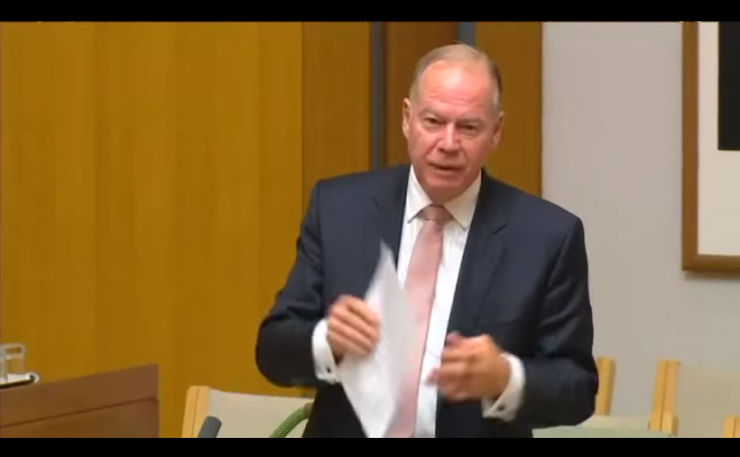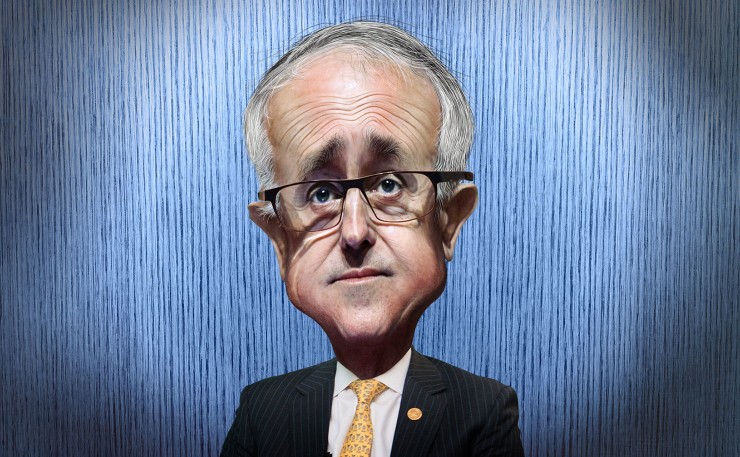After months of phony war the government has gone back to square one. It’s starting to become a serious problem for the PM, writes Ben Eltham.
The Turnbullian crusade for tax reform seems to have run into trouble.
Malcolm Turnbull’s new-look government returned from the summer break full of vim and vigour, and apparently squarely behind a push for an increase in the Goods and Services Tax. Broad hints were given: the GST would be raised, in return for income and company tax cuts. Journalists were backgrounded and backbenchers briefed.
For a while, things seemed to be going well. State premiers were happy – they want the extra GST revenue to pay for expensive schools and hospitals. South Australia’s Jay Weatherill was supportive; he has been pushing for a higher GST since November. Big business was also pleased – reducing company tax, to be paid for with a rise in the GST, has long been a cherished goal.
But the good ship Tax Reform finds itself suddenly becalmed. Instead of providing the signature issue of an election year, tax now seems to be an issue that the government can’t make up its mind about.
Do we need more tax? Less tax? A better “tax mix”? Or a “tax mix switch”?
Is a rise in the GST on the table, or off the table? What about superannuation? Or negative gearing?
Your guess is good as mine, because so far the government has offered little but confusion.
In Question Time yesterday, Prime Minister Turnbull explained that the GST was probably not going to be increased.
“We are not, the Government is not yet persuaded that in the context of Australia today, such a tax mix switch would give an adequate growth, adequate improvement in economic activity,” Turnbull declared.
Turnbull was trying to explain that reducing income and company tax in return for raising the GST was probably not going to be an economic bonanza. Hence, he was not persuaded of the merits of a tax mix switch.
But few voters will understand what a “tax mix switch” is. Who can blame them? No firm details have been announced. No tax white paper has been released. No detailed Treasury modelling has been published.
There are no prizes for guessing why the government is backtracking on a GST hike. After three weeks of the GST debate running, the government has had a chance to look at the opinion polls and listen to the views of voters. And voters have been unequivocal: they hate the idea of raising the GST.
This is scarcely surprising. After years of being told by Tony Abbott of the dangers of the carbon tax – a “great big tax on everything” – voters have done some simple arithmetic and realised that the GST is even bigger and taxes even more things. And hiking the GST is regressive: it will hurt poorer voters most. Many ordinary citizens want taxes to be raised on big companies and wealthy individuals before the broad-based consumption tax is increased.

Coalition backbenchers heard the message, loud and clear. In a party room meeting, Victorian MP Russell Broadbent reminded his colleagues that he had fought two elections on the GST, in 1993 and 1998. He lost his seat both times. Published opinion polls backed Broadbent’s analysis. A recent Newspoll found voters opposed to the rise, 54 to 37 per cent.
In recognition of the political dangers, Turnbull has now walked away from the GST. Instead he has signalled that the government may look at other tax reform options instead. But which options? We still don’t know.
What is the purpose of “tax reform”? Like many a policy debate under the nebulous banner of “reform”, the phrase is uttered so regularly and with so many different meanings that it can be difficult to discern if it means anything at all.
Is tax reform about fixing up the deficit? It’s no secret that the Australian government spends more than it receives in revenue. Many voters might assume that this is the point of tax reform, given the well-documented “budget emergency” trumpeted by Tony Abbott and Joe Hockey. But no, Scott Morrison has told us, this is not the point of tax reform. In fact, Morrison wants overall tax rates to fall.
Is tax reform about reducing personal income tax? The government has spent a lot of effort in recent days telling anyone who’ll listen that it aims to fight bracket creep – the inflation-driven movement of middle-income earners into higher tax brackets. Bracket creep is bad, because it punishes middle-income earners. But bracket creep is also lucrative, because it passively brings in extra revenue each year. Giving taxpayers relief will be expensive – new sources of revenue will need to be found.
Or is tax reform about spurring economic growth? The business lobby, especially the Business Council of Australia’s Jennifer Westacott, are very keen on the supposed benefits of changing the “tax mix.” This is shorthand for increasing taxes on consumption – the GST – in return for reducing supposedly inefficient taxes on income and profits. It just so happens that such a move would reduce company taxes, which big business hates. We’re assured that this will spur economic growth. The Prime Minister is apparently unconvinced.
Perhaps tax reform is about fairness – about protecting the neediest in our community, while ensuring those who can afford to pay their fair share. This is a view that Labor has long articulated but that Malcolm Turnbull has at times gestured towards too. If that’s the case then “reform” should concentrate on removing regressive tax breaks for housing investors and wealthy superannuants. The government has hinted at some of this but again we don’t really know.
The confusion over tax reform goes further than just the issue of raising the GST. More fundamentally, it exposes the fault-lines of Australia’s increasingly rickety fiscal policy.
Australia is in structural deficit. Both the Commonwealth and the states and territories have huge unfunded liabilities looming in future years but lack the revenues to pay for them. It’s not just the usual mantra of roads, schools and hospitals. The Commonwealth has committed to an arms build-up for the Australian Defence Force. Tens of billions of dollars of extra spending on the National Disability Insurance Scheme are scheduled. Public infrastructure spending is at near record lows. And the states and territories have those notorious $80 billion of health and education cuts to look forward to – baked in from the 2014 budget, and poised to bite in 2018.
In other words, Australia needs to raise revenue if we are to continue to enjoy the high standard of public services we’ve come to expect. But no government enjoys raising taxes. The dilemma illustrates just how difficult Scott Morrison’s first budget in May will be.
In summary, the tax debate is a befuddling mess.
The growing confusion over tax reform could well come back to haunt Turnbull and the government. Big business is already angry at him for walking away from cutting company tax. Ordinary voters are scared about a GST hike. Key interest groups like superannuants and landlords are now worried about cuts to their much-loved tax breaks. The longer the debate swirls, the more damage it risks doing to the Coalition’s cause.
When, in 2010, Kevin Rudd walked away from a solemn commitment to pricing carbon, voters judged the backflip harshly. Similar dangers lurk for Turnbull. As the tax confusion increases, a disappointing impression of Turnbull is beginning to form. Maybe the Prime Minister is not quite as decisive and authoritative as many had hoped. Maybe he is – wait for it – just another politician.
Donate To New Matilda
New Matilda is a small, independent media outlet. We survive through reader contributions, and never losing a lawsuit. If you got something from this article, giving something back helps us to continue speaking truth to power. Every little bit counts.





